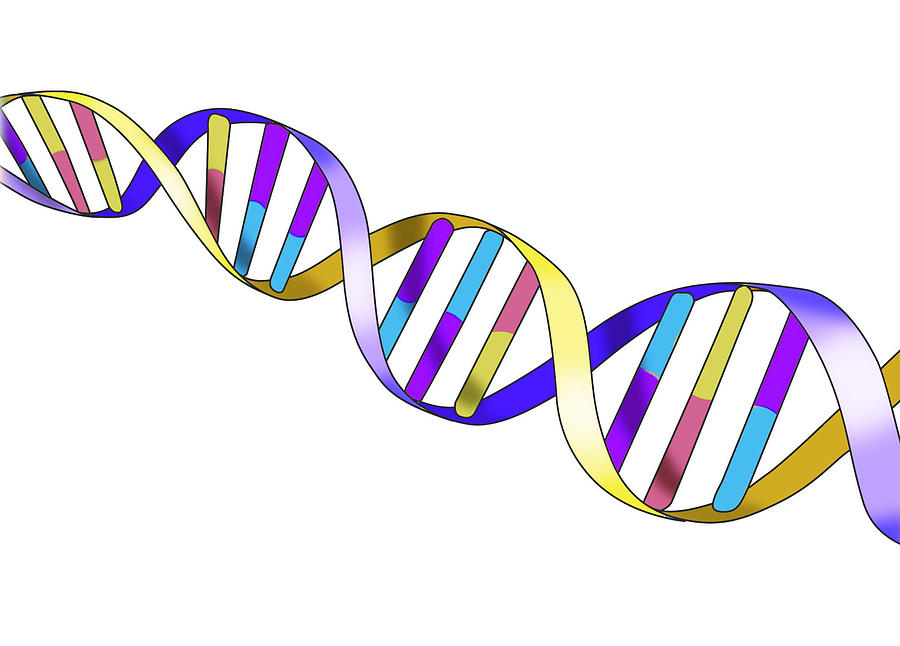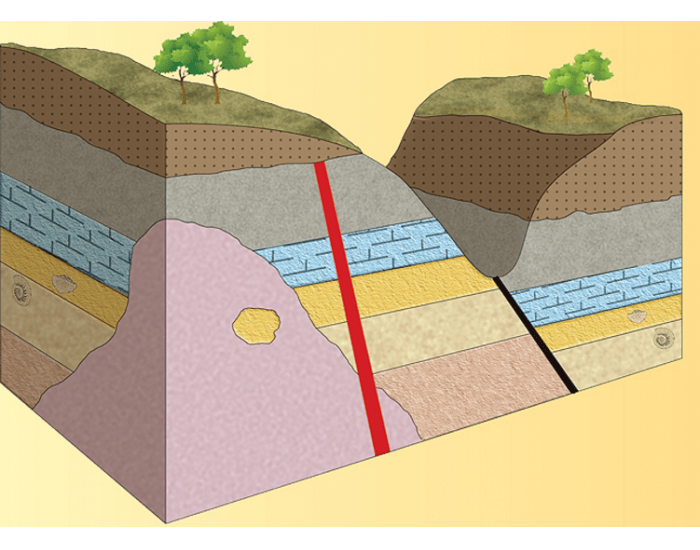Determining the order in which events happened or the age of one object in relation to another, without knowing their exact ages is called....
Relative Dating
This molecule carries the genetic instructions for all living things and is shaped like a double helix.

What is DNA?
The Law of Conservation of Energy/Matter states that energy/matter cannot be (50 pts) _______________ but can change from one (50 pts) _______________ to another
- created or destroyed
- form
Structures inside the cell that have specific functions to help keep the cell alive and working within the body.
What are organelles?
The type of rock formed by cementation of smaller rocks, fossils, and small organic particles
What is Sedimentary rock?
What is the name of the law best demonstrated in this picture?

+100 for writing what the Law states
Law of Superposition/Law of Horizontality:
Rocks form in horizontal layers - the oldest layers are found towards the bottom while younger layers are found towards the top
This thread-like structure found in the nucleus of a cell carries genetic information in the form of DNA.
What is a Chromosome?

Does this model demonstrate a physical change or a chemical change?
chemical change
This organelle is known as the powerhouse of the cell: Identify this organelle

+100: State why this organelle is named this way
The Mitochondria
Extra: it is called the powerhouse of the cell because it helps to use sugars and carbohydrates to create energy for the cell to function
This type of rock is formed from extreme heat and pressure
Metamorphic rock
If an igneous intrusion is found cutting across sedimentary rock layers, the intrusion must be younger than the layers.
True or False
True
Most people on Earth have brown eyes. Only about 8-10% of all people on Earth have blue eyes. Having blue eyes is then called a _________________ trait
+100: What would eye color considered to be: part of our genotype or phenotype?
Recessive
+100: Phenotype
Write out the chemical formula for methane, which contains one Carbon (C) atom and four Hydrogen (H) atoms
+200: Draw out how the chemical bonds would be arranged
CH4
Extra:
![]()
All living things have cells: List two main differences in structure between an animal and a plant cell
Answers may vary
- Animal cells tend to be more circular; plant cells more square/rectangular
- Plant cells have a cell wall in addition to a cell membrane; animal cells only contain a cell membrane
- Plant cells have a large central vacuole to hold liquid; animal cells have several small vacuoles
- Only plant cells have a chloroplast, which helps them to create energy using sunlight; animal cells do not contain this
This type of rock is made when magma cools down
Igneous rock
Plate tectonics, earthquakes, volcanic activity, weathering, erosion, deposition, and glacial movement are all examples of this.
Geologic processes
Ms. Diaz is looking to grow more purple flowers in her classroom garden. She wants to cross-pollinate two plants; Plant A has the genotype Pp for purple flowers, and Plant B has the genotype pp for white flowers.
Which plant's genotype would be considered to be heterozygous?
Plant A because each allele is different (dominant and recessive)
Write out the chemical formula for glucose, which contains six Carbon (C) atoms, twelve Hydrogen (H) atoms, and six Oxygen (O) atoms
C6H12O6
This body system circulates blood around our bodies to move oxygen, nutrients, and waste to the different organs throughout.
The circulatory system
These two processes work together to break down rocks into smaller pieces and move them to new locations, helping form sedimentary rocks.
Weathering and erosion
For full credit:
- Identify one geologic process or event that must have happened
- identify evidence to support your answer

Answers will vary
- Magma must have pushed up into the layers after the layers formed. There is an inclusion that cuts through several layers
- A tectonic shift/earthquake must have happened after the layers were formed. There is a fault line that cuts through the layers; we can see similar layers on both sides that are at different heights on either side of the fault
- Igneous rock was formed. Magma pushed its way up through the rock layers and cooled to form an igneous rock inclusion
- Erosion happened. The rock faces on either side of the fault are rounded and smoothed away
Ms. Diaz is looking to grow more purple flowers in her classroom garden. She wants to cross-pollinate two plants; Plant A has the genotype Pp for purple flowers, and Plant B has the genotype pp for white flowers.
Draw what the Punnet Square would look like for the plants Ms. Diaz wants to cross pollinate.
+100: What is the percentage chance she would be able to produce a flower with purple flowers?
A version of this:
Extra: 50%
Kailey wanted to perform an investigation. She placed baking soda (2NaHCO3) on a plate and baked it in the oven at 400 degrees F for 15 min. Only a solid substance remained on the plate
2NaHCO3 --> Na2CO3 + CO2 + H2O
baking soda --> sodium carbonate + carbon dioxide + water
Kailey claimed the total mass would not change when heated in the oven. Why is this claim false?
The oven is not a closed system, the gas (Carbon Dioxide) is able to escape the oven
This body system helps us to breathe by taking oxygen from the air into our lungs and carrying carbon dioxide out of the body through our breath.
The respiratory system
This process, in which sediments are pressed and compacted together over time, is a key step in forming sedimentary rocks.
Compaction